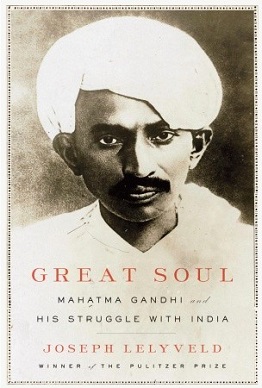Great Soul: Mahatma Gandhi and His Struggle with India

Front cover of the first American edition
|
|
| Author | Joseph Lelyveld |
|---|---|
| Country | USA |
| Language | English |
| Subject | Mohandas Karamchand Gandhi |
| Genre | Biography |
| Publisher |
Alfred A. Knopf (US) Harper Collins India (India) |
|
Published in English
|
March 29, 2011 |
| Pages | 432 |
| ISBN | |
Great Soul: Mahatma Gandhi and His Struggle With India is a 2011 biography of Indian political and spiritual leader Mohandas Karamchand Gandhi written by Pulitzer Prize-winning author Joseph Lelyveld and published by Alfred A Knopf.
The book is split between the time Gandhi spent in South Africa and his return to India as the Mahatma.
The Legislative Assembly of Gujarat, the lawmaking body of Gandhi's home state voted unanimously on March 20, 2011 to ban Great Soul because of the controversy. Lelyveld has stated that the gay interpretation of his work is a mistake. "The book does not say that Gandhi was bisexual or homosexual. It says that he was celibate and deeply attached to Kallenbach. This is not news."
Writing for The New York Times, Hari Kunzru finds Great Soul to be "judicious and thoughtful". Lelyveld's book, he writes, will be revelatory to American readers who may only be familiar with the rudiments of Gandhi's life and for those readers, perhaps especially Indian readers, who are better acquainted with the Gandhi story the book's portrait of the man will still be challenging.
Reports of passages within the book regarding the nature of Gandhi and Kallenbach's relationship prompted the Wall Street Journal to ponder "Was Gandhi gay?" Kunzru for the Times observes that modern readers who are less familiar with the concept of Platonic love may interpret the relationship, in particular their romantic-sounding letters, as indicating a sexually charged relationship. However, he adds that Gandhi took a vow of celibacy in 1906, which both Gandhi and the people of India saw as a cornerstone of his moral authority.
British historian Andrew Roberts, in writing for The Wall Street Journal, counters this idea of celibacy, with descriptions of Gandhi's 'testing' of his vow of celibacy with young women. He also quotes passages from Gandhi's letters to Kallenbach included in the text, such as "how completely you have taken possession of my body. This is slavery with a vengeance" to support his conclusion that Gandhi was a "sexual weirdo" along with being "a political incompetent and a fanatical faddist".
...
Wikipedia
